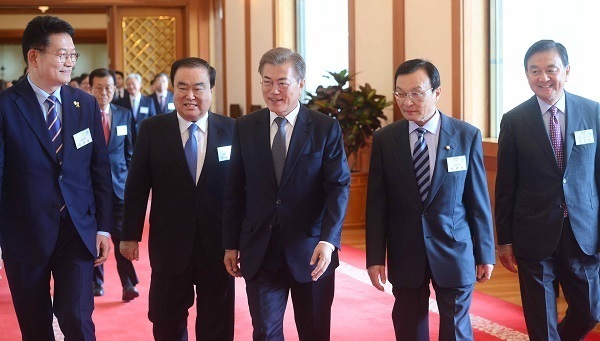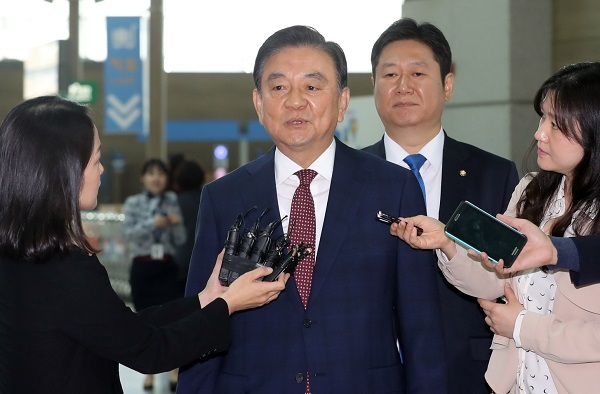With a trade of phone calls and special envoys, President Moon Jae-in is kick-starting top-level diplomacy, bringing an end to a monthslong vacuum that sparked concerns about Seoul’s weakened voice on North Korea and other pressing foreign policy and security issues.
Moon’s messengers to the US and Japan, former Chairman of JoongAng Media Network Hong Seok-hyun and senior Democratic Party of Korea lawmaker Moon Hee-sang, respectively embarked on their trips early Wednesday.
 |
President Moon Jae-in heads for a lunch meeting with his special envoys at Cheong Wa Dae in Seoul, Tuesday. From left are Song Young-gil, special envoy to Russia; Moon Hee-sang, envoy to Japan; President Moon; Lee Hae-chan, envoy to China; and Hong Seok-hyun, envoy to the US. (Yonhap) |
Other envoys, Democratic Party Rep. Lee Hae-chan to China, former Incheon Mayor Rep. Song Young-gil to Russia, Sogang University economist Cho Yoon-jae to the European Union and Germany, and Archbishop Hyginus Kim Hee-joong to the Vatican, are scheduled to depart later this week.
All of them are armed with Moon’s letter to his respective counterpart, as well as messages carrying his resolve and ideas for better bilateral ties.
The dispatch will resuscitate summit diplomacy that has been at a standstill since a sweeping political scandal involving then-President Park Geun-hye broke out last October, which culminated in her impeachment and ensuing ouster in March.
The envoys’ chief task is to lay the groundwork for smooth future summits by promoting understanding of the liberal new president’s thinking on key policy issues which may be poles apart from that of his predecessor.
Moon pursues a return to dialogue with North Korea in the face of accelerating global sanctions and a pressure campaign, while seeking parliamentary approval for the ongoing deployment of the US’ Terminal High Altitude Area Defense missile shield here, for which US President Donald Trump has demanded Seoul pay $1 billion.
Relations with China have also been severely damaged in recent months as it took economic retaliation against South Korea over the THAAD installment. With Japan, Moon has pledged to upend a December 2015 settlement on the issue of Korean women forced into sex slavery during World War II.
The president’s advisory team agreed during a meeting with visiting White House officials on Tuesday to organize a summit with Trump in late June in Washington. Moon is also expected to have his first face-to-face talks with Chinese President Xi Jinping and Japanese Prime Minister Shinzo Abe on the margins of the Group of 20 conference in July in Hamburg, Germany.
Though Moon exchanged basic opinions about urgent matters during last week’s phone calls with the other leaders, the key would be to minimize the gap between them in advance -- or at least prevent it from dictating their upcoming meetings.
 |
Hong Seok-hyun, envoy to the US (Yonhap) |
“The most important thing is to share views and enhance mutual understanding on the South Korea-US alliance and resolving the North Korea nuclear issue,” Hong told reporters before leaving for Washington.
He said he was also instructed to discuss the THAAD issue but signaled a change in Moon’s position, saying, “There should be some difference between what you say as a candidate and after becoming the president.”
The two sides are expected to consult on how to restrain the North’s nuclear and missile program and set prerequisites for talks, building on the Tuesday meeting led by former Ambassador to Geneva Chung Eui-yong and Matt Pottinger, senior director for East Asia at the White House’s National Security Council. During the session, they agreed to mobilize “all available means” including dialogue under the “right conditions,” and explore “bold and pragmatic” steps with the ultimate goal of completely abolishing the program.
Speaking before an emergency meeting of the UN Security Council on Tuesday in New York, US Ambassador to the UN Nikki Haley said Washington is willing to talk to Pyongyang, but “not until we see a total stop of the nuclear progress and of any test there.”
Japan envoy Moon Hee-sang, for his part, said he was planning to elucidate the new administration’s resolve to revive back-to-back summit talks and the stance on a sex slavery accord during his visit.
Moon’s skepticism over the settlement heralded a rough ride. During the phone conversation, he told Abe that most South Koreans cannot accept the agreement emotionally and the government has limited authority in managing a “comfort women” statue set up by civic groups.
But the envoy said he would not suggest any renegotiation of the deal, calling it “overplaying.”
“It will be difficult to settle on a detailed time frame (for a summit) but we will have to sound out each other’s thought,” he told reporters upon his arrival in Tokyo.
“The basic intention is to meet as quickly as possible and as many (times) as possible.”
By Shin Hyon-hee (
heeshin@heraldcorp.com)








![[Today’s K-pop] Blackpink’s Jennie, Lisa invited to Coachella as solo acts](http://res.heraldm.com/phpwas/restmb_idxmake.php?idx=644&simg=/content/image/2024/11/21/20241121050099_0.jpg)
